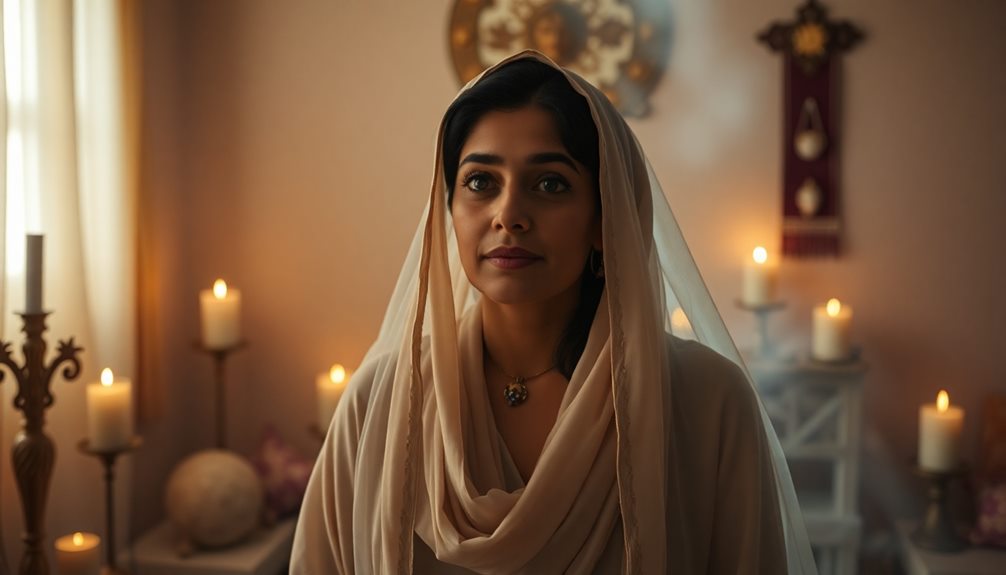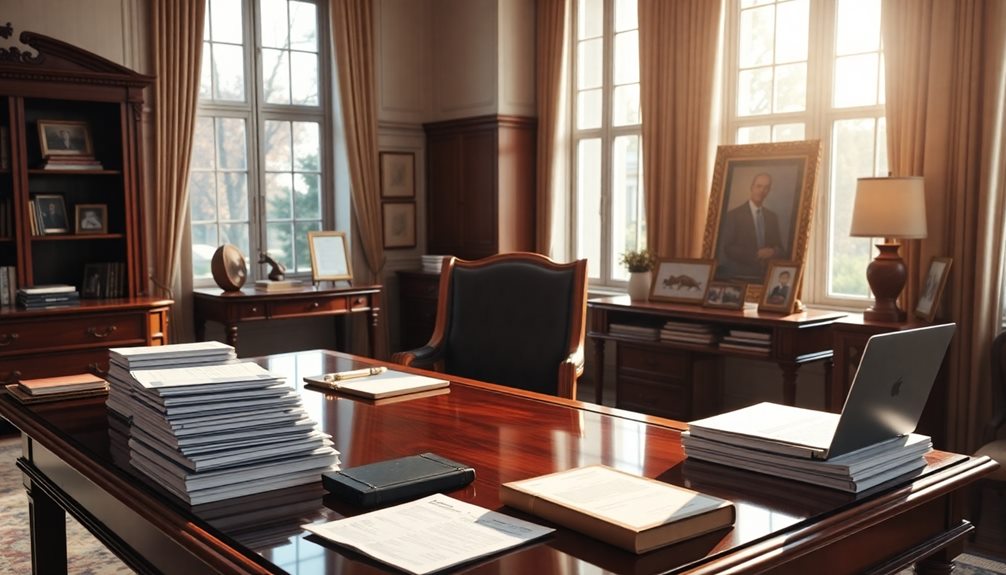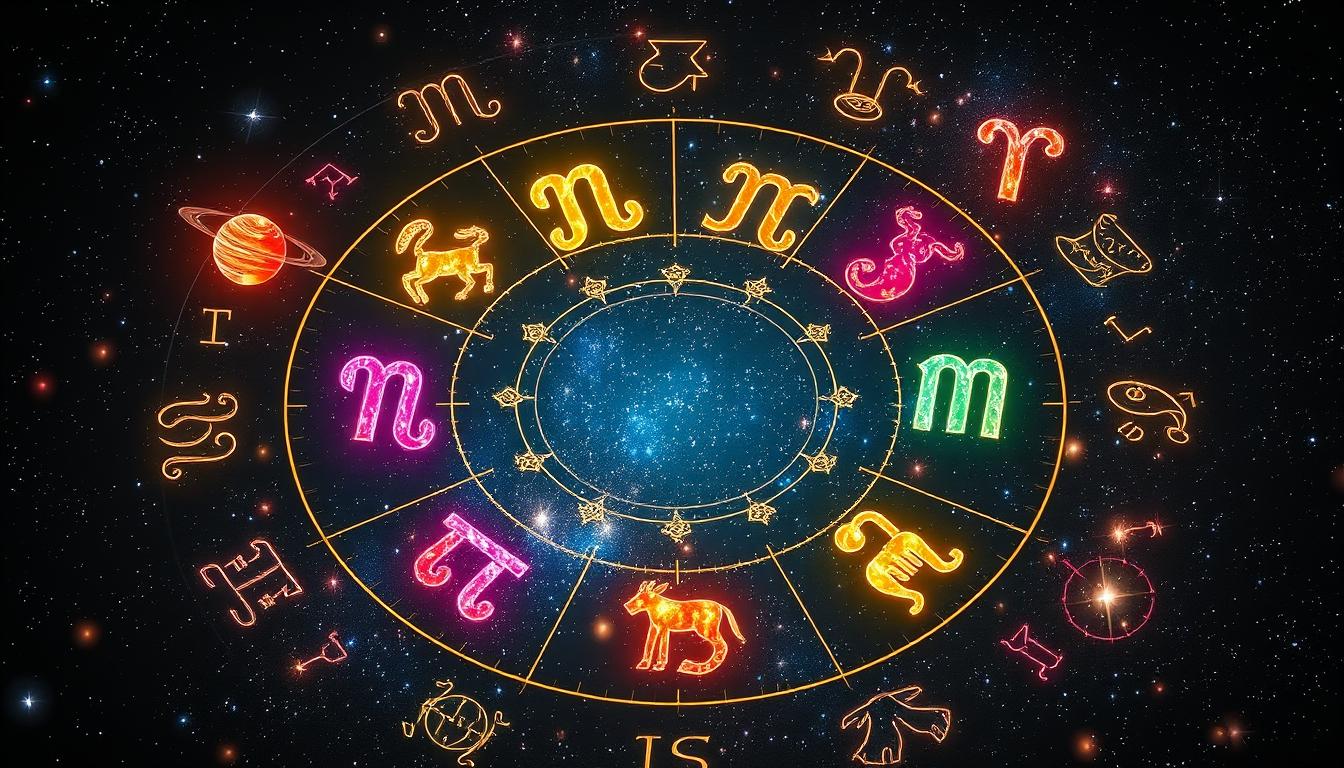Bushra Bibi captures attention as Pakistan's First Lady, merging spirituality with tradition. Born into the powerful Wattoo clan, she previously married Khawar Maneka, having five children. Her spiritual connection with Imran Khan blossomed at a shrine in 2015, leading to their marriage in 2018. Known for her faith-healing practices and niqab-wearing, Bushra embodies a blend of modern womanhood and cultural values. Despite her low-profile lifestyle, she faces intense public scrutiny amid legal challenges faced by Imran Khan. Her complex personal choices spark debates about faith and public duty, inviting curiosity about her life's intricacies.
Key Takeaways
- Bushra Bibi, hailing from the influential Wattoo clan, values family and spirituality in her private life, being a mother of five from her previous marriage.
- As the first niqab-wearing spouse of a Pakistani Prime Minister, she embodies a unique blend of tradition and faith expression.
- Her marriage to Imran Khan, proposed without seeing her face, reflects deep spiritual commitments and values.
- Bushra serves as a spiritual adviser to Imran Khan, influencing his political vision through Sufi traditions and mysticism.
- Public scrutiny surrounding her personal choices and previous marriage has sparked debates on ethics, legality, and the intersection of personal and political life.
Introduction

Bushra Bibi, the wife of former Prime Minister Imran Khan, stands out not just for her marriage to a prominent political figure but also for her unique background and spiritual identity. Born into the politically influential Wattoo clan in Punjab, she previously married Khawar Maneka and has five children.
You might find it intriguing that her first meeting with Imran Khan occurred in 2015 at the Shrine of Baba Farid, facilitated by her sister. Their marriage followed in February 2018, just seven months after her Iddat period ended.
Bushra Bibi's life is characterized by her low-profile lifestyle, where she embraces her role as a faith healer, drawing public interest for her mystical connections. As the first Niqab-wearing spouse of a Pakistani Prime Minister, she symbolizes a personal expression of her faith and spirituality.
However, their relationship hasn't been free from challenges. The couple faces considerable media scrutiny, especially regarding the legal controversies surrounding their marriage and Imran Khan's political influence.
Despite this, Bushra remains a figure of intrigue, navigating her private life amid the public eye.
Background

Born into the prominent Wattoo clan, Bushra Bibi's upbringing in central Punjab laid the groundwork for her unique journey. Coming from a politically influential family, she was well-acquainted with the dynamics of Pakistani society.
Her previous marriage to Khawar Maneka, a senior Customs official, produced five children—three daughters and two sons—demonstrating her commitment to family and traditional values.
Bushra first crossed paths with Imran Khan in 2015 at the Shrine of Baba Farid, where her sister introduced them. This meeting sparked a spiritual connection that would lead to their marriage in February 2018.
Khan's proposal was notable, as he made it without having seen her face, highlighting Bushra's dedication to her values and beliefs.
As a recognized faith healer, Bushra Bibi has garnered a mystical reputation, which contrasts with the high-profile images of Khan's previous wives.
Now, as Pakistan's first lady, she embodies a blend of spirituality and tradition, influencing the narrative of modern Pakistani womanhood.
Her journey reflects a unique fusion of personal and political realms, making her a significant figure in contemporary Pakistan. Her advocacy for human rights and social justice has garnered both national and international recognition. Through this lens, the comparison of public and private lives within societal structures often mirrors complex relationships, much like the rumored ‘alejandro fernandez and ana relationship,’ where personal connections become a subject of public interest. In a similar fashion, her own life navigates the intersection of individual identity and collective responsibility, shaping her role as a powerful force in Pakistan’s evolving political landscape. This dynamic interplay between the personal and political underscores the challenges and triumphs of her journey, offering insights into the broader societal context in which she operates. Much like figures such as Priti Patel British politician, whose career exemplifies the balancing act between personal convictions and public obligations, her story underscores the resilience required to bridge these often-competing spheres. By embracing both her individuality and her commitment to societal progress, she continues to inspire transformative change within Pakistan and beyond.
Faith Healer's Influence on Politics

A significant aspect of Imran Khan's political landscape is the influence of Bushra Bibi as a faith healer. Known for her spiritual practices, Bushra serves not only as Imran's wife but also as a spiritual adviser who's shaped his political vision. Their connection, deeply rooted in Sufi traditions, emphasizes mysticism and spirituality, enhancing her perceived political influence in Pakistan.
During Imran Khan's legal troubles, public interest in Bushra surged. Many supporters viewed her as a source of strength, believing her faith healing abilities provided guidance during challenging times. This intersection of faith and politics has sparked discussions about the role of spiritual figures in governance.
While some remain skeptical about her mystical claims, Bushra's involvement has undeniably impacted Khan's approach to leadership. The couple's dynamic illustrates how personal beliefs can intertwine with political motivations.
As Imran navigates the complexities of governance, Bushra's faith healing practices continue to resonate with many, reflecting a unique blend of spirituality and political strategy. Ultimately, her influence highlights the ongoing significance of mysticism in the political fabric of Pakistan.
Social Media Backlash Intensifies

Increasingly, social media has become a battleground for public opinion regarding Bushra Bibi amidst the legal controversies surrounding her marriage to Imran Khan. The backlash intensified following their sentencing for corruption charges, with many questioning the legitimacy of their marriage timeline and adherence to legal norms.
As discussions unfold, the scrutiny on Bushra Bibi has only deepened, particularly concerning the Iddah law in Pakistan. Critics argue the marriage raises ethical and legal questions, igniting fierce debates online.
The situation worsened when interviews with Bushra's former husband, Khawar Maneka, surfaced, adding fuel to the fire with allegations of an affair prior to her union with Khan. This social media discourse reflects a polarized public opinion, where supporters and detractors clash over the implications of her marriage and its legal ramifications.
As updates on the ongoing legal proceedings emerge, they keep Bushra Bibi in the spotlight, making her a focal point of discussion in both political and social spheres. The intense scrutiny she faces highlights the complexities of her position as Pakistan's First Lady amid a turbulent political landscape.
Public Scrutiny of Personal Choices

Public opinion on Bushra Bibi's personal choices has come under intense examination, particularly in light of her marriage to Imran Khan and her unique position as Pakistan's First Lady. As the first niqab-wearing spouse of a Pakistani Prime Minister, her choice to wear the full veil has sparked debates, with many viewing it as a personal expression of faith. However, others see it as a controversial statement.
Bushra's previous marriage to Khawar Maneka and her five children add layers to the public's interest in her family dynamics. The timeline of her marriage to Imran Khan, especially the claims of marrying during her Iddat period, has led to legal proceedings and questions about the union's legality. This scrutiny intensifies as media coverage delves into every aspect of her personal life.
Moreover, her role as a spiritual adviser and faith healer generates mixed reactions; some respect her influence over Imran Khan's political decisions, while others remain skeptical.
As a first lady, Bushra Bibi's choices are magnified, and the public's relentless scrutiny raises critical questions about the intersection of personal life and public duty.
Frequently Asked Questions
Who Is the First Wife of Pakistan?
The first wife of Pakistan is a significant figure, often recognized for her influence and contributions. You might find her role in society evolving, shaping public perception and discussions around women's leadership in the country.
What Happened to Imran Khan's Wife?
Imran Khan's wife faced legal challenges, including a 14-year prison sentence for corruption charges. After nearly nine months, she was granted bail, maintaining her and Khan's innocence amid claims of political motivations behind the allegations.
How Many Kids Does Bushra Bibi Have?
Bushra Bibi has five children from her previous marriage. You'd find that she has three daughters and two sons, who've pursued their education and careers while maintaining a low profile in public life.
Is Imran Khan a Sufi?
You might consider Imran Khan as someone who appreciates Sufi traditions, often incorporating their philosophies into his speeches. However, the depth of his commitment to Sufism remains a topic of debate among commentators.










